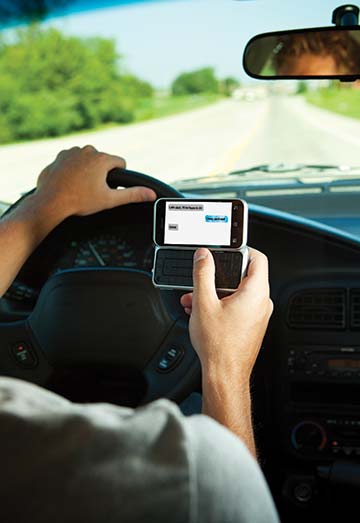
 By Robert Erven Brown
By Robert Erven Brown
Making the case for a church social media policy that prohibits texting while driving
“Why do you think we need a cell phone/texting policy?” the exasperated business administrator asked me.
This question led to a legal discussion which raised his awareness about how the church can be held financially responsible for a texting (or “sexting”) incident. A few basic legal concepts govern the courts when they attempt to allocate fault — responsibility to pay damages — among the various participants in an automobile crash.
Principle 1: A church (usually a corporation) acts through its “authorized agents.” These agents include pastors, staff and volunteers.
Principle 2: Unless the church has a written policy which prohibits using a cell phone or texting on a cell phone while driving, the use of the cell phone is considered to be an authorized action, if it’s done by an authorized agent acting within the scope of his or her authority. In general, any activity which can reasonably be said to promote the purpose for which the church was formed will be an authorized act. The major exception to this rule occurs if the church board of directors has adopted a formal resolution creating a policy forbidding, conditioning or limiting the activity and takes reasonable steps to enforce it.
——————————————————————————————————————————
RELATED RESOURCES:
- WEB-EXCLUSIVE: 5 questions to consider before your next church trip
- Why one church sold its buses and decided to rent instead
- Auto exposure: A “black swan” for nonprofits
——————————————————————————————————————————
Principle 3: Both the church and the agent are liable for reasonable damages caused by their negligent behavior.
Principle 4: Driving while distracted places innocent people in peril. Texting and talking on a cell phone while driving have been held repeatedly by courts to constitute “driving while distracted.”
If a pastor, staff or volunteer injures an innocent person because he or she was negligently “driving while distracted,” then both the church and the driver can be held financially responsible.
Policy considerations
When considering whether or not to adopt a policy, your church board of directors should consider:
What are the benefits of allowing our “agents” (pastors, staff and volunteers) to talk on cell phones and send/receive text messages while operating a moving vehicle?
Is the content of a call and/or text message so important that it must be seen instantly? Imagine you’re a juror as a distracted driver tries to “explain” why his loss of one minute is more important than the injured person’s loss for a lifetime. Does this calculation honor Christ?
Do local or state laws ban or restrict cell phones, hands-free devices or texting?
Have you checked with your church’s insurance company for their “best practices” recommendation?
Is your organization willing and able to enforce the policy? Failing to do so can, in some cases, be worse than not having a policy at all.
What practical steps can you take to insure compliance? Training classes? Certification forms signed by all those who drive? Announcements from the pulpit?
——————————————————————————————————————————
READER SNAPSHOT:
70% own and operate church vehicles.
Source: “The Church Executive Reader Survey”
——————————————————————————————————————————
Know your exposures
The church bears the legal and financial risks of “distracted driving” by its agents — not only financial damages, but also psychological trauma. Adverse media coverage blackens the name of Christ when his “agents” negligently injure innocent people.
The distracted driver potentially faces criminal prosecution and jail time for “involuntary manslaughter” if the conduct involves a high degree of risk. A charge of “gross negligence” could arise if the church board or staff was aware of the texting and failed to stop it.
Moreover, insurance coverage for damages for gross negligence is very uneven, and sometimes non-existent. And, the State and Federal Volunteer Protection Acts don’t protect volunteers from damages arising from gross negligence or criminal acts.
Is it truly worth it?
When you weigh the risks and benefits of failing to aggressively prohibit distracted driving, it’s obvious that this is a significant threat to any church. This threat has become all the more real in light of a 2013 New Jersey case (Kubert v. Best, Colonna) which held that a person who knowingly sends a text to a person who’s driving can also be held liable for the accident under certain conditions.
Now that you’re aware of the issue, what are you — personally — going to do about it?
Robert Erven Brown is an attorney licensed to practice in Arizona. He and his nonprofit practice group work with non-profits and churches, helping them manage key operations connected with their missions, visions and causes. As permitted by local Rules of Ethics, they collaborate with attorneys who are licensed in states other than Arizona. He is the author of Legal Realities: Silent Threats to Ministries, which describes his Campus Preservation Planning© initiative — a comprehensive program designed to manage the wide array of risks facing non-profit organizations. [silentthreats.com]
This publication is designed to provide accurate and authoritative information in regard to the subject matter covered. It is provided with the understanding that the publisher is not engaged in rendering legal, accounting or other professional service. If legal advice or other expert assistance is required, the services of a competent professional person should be sought. “From a Declaration of Principles jointly adopted by a Committee of the American Bar Association and a Committee of Publishers and Associations.” Simply reading this material this does not create an attorney/client relationship with Brown, as this article is general legal information, not legal advice. A formal attorney/client relationship will not be established until a conflict check is completed and an engagement letter has been signed by both the attorney and the client. No “informal” legal advice will be provided by telephone. Simply sending an e-mail to Brown will not create an attorney/client relationship.


